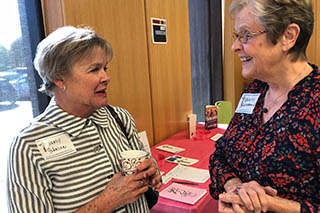“There are only four types of people in the world:
Those who have been caregivers.
Those who are currently caregivers.
Those who will be caregivers and those who will need caregiving.” Rosalyn Carter
As this quote suggests, all of us will be in the role of providing care to another person at some time in our lives. Caregiving can be an emotional rollercoaster. Caring for a family member can be personally rewarding and an expression of love and compassion. It can also be physically and emotionally overwhelming.
The effects of caregiving can impact a person’s health and well-being. According to research by the Family Caregiver Alliance, caregivers report sleep deprivation, poor eating habits, lack of exercise, and failure to attend to their own health issues. The prolonged periods of stress and physical demands of caregiving can also take a toll on a caregiver’s mental health. Studies show that 60% of caregivers are clinically depressed. They are also at risk for alcohol and drug abuse.
Because of the overwhelming stressors involved in caring for a person it is critically important that you practice self-care; that is, attending to your own mental, physical, emotional and spiritual well-being. Failure to take care of ourselves can lead to “caregiver burnout’’ and the inability to help another who depends on us. As the adage says, “From an empty cup, we can not pour,” practicing self-care keeps our cup full, so we can effectively manage the daily stressors that are part of caregiving.
Self-care is participating in activities and practices on a regular basis to reduce stress and enhance our well-being. These activities should be part of our daily routines and not just something we do when we have the time. At the essence of self-care are two aspects: self-awareness and self-compassion. Self-awareness enables us to understand what restores, energizes and enables us to manage stress. These activities are very individualistic and will look different from person to person. For example, an introvert may cherish time alone to reenergize while an extrovert might be rejuvenated by spending time with others.
How can you begin to identify those activities that rejuvenate your mind, body and spirit? A good starting place is to create a list of things that bring you enjoyment, relaxation, and energy. These things can be as simple as playing with your pet, listening to music, taking a walk or talking to a friend. There are also many tools on-line to guide you in making your list like “The Self-Care Wheel” by Olga Phoenix.
Understanding and identifying what energizes you is one component of self-care. The other equally important aspect is self-compassion. Practicing self-compassion means being kind to yourself. It is giving yourself permission to make mistakes. It includes filling your self-talk, your “inner voice” with messages of positivity and possibility. Negative self-talk (“I can’t do this,” “Nothing is going right”, “I keep making stupid mistakes”) can be very draining and destructive. A good self-talk rule of thumb: if you wouldn’t say it to a friend, don’t say it to yourself. The mind is a powerful thing and if we fill it with thoughts of possibility, our focus will shift and we will be open to better options and outcomes for ourselves and the one we support.
There are many resources available to assist you in caregiving. The Family Caregiver Alliance (www.caregiver.org) is a good website for general information. Passages in Caregiving by Gail Sheehy contains many practical tools to guide you through the different phases of caregiving with focus on mental, spiritual and physical aspects of providing care.
Caregiving is an act of love and compassion that requires persistence, patience and inner strength. It is serving as the hands of Christ in the world. When providing care for others, take the time to care for yourself. Being your best allows you to give your best to others.
Submitted by: Tracie Glasscock





